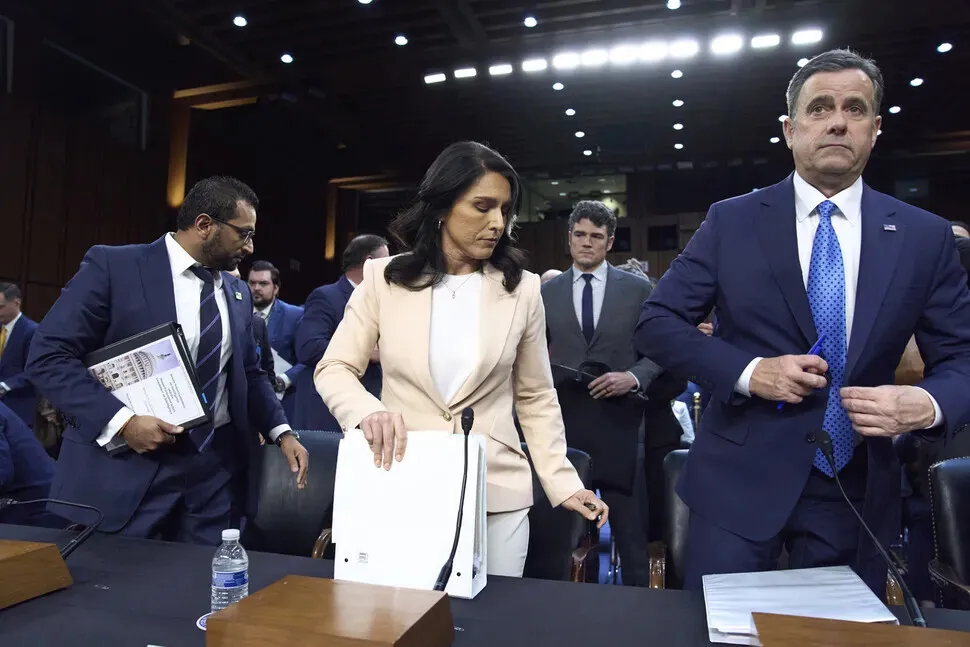hankyoreh
Links to other country sites 다른 나라 사이트 링크
Recent events are aiding Pyongyang’s pursuit of nuclear power status, US intelligence report says

The Office of the Director of National Intelligence in the US concluded that a situation is taking shape that will facilitate North Korea achieving its longstanding aim of being recognized as a nuclear power.
The analysis appears to go a step further than an assessment made in the same report last year, which described North Korea as hopeful of using its increased cooperation with Russia as a means of gaining recognition as a nuclear power. The report’s conclusion last year that North Korea has no intention of abandoning its nuclear weapons through negotiation was retained in this year’s report.
The conclusion was shared by the ODNI in its “Annual Threat Assessment of the US Intelligence Community” report, which was presented at a US Senate Intelligence Committee hearing on Tuesday.
“North Korea’s advancing strategic weapons capabilities and increasing access to revenue are enabling Kim’s longstanding goals of securing international acceptance as a nuclear power, reducing US military presence on the Korean Peninsula, expanding state control over the North’s economy, and blocking foreign influence,” the report said.
Also included was the assessment that Russia was “increasingly supporting North Korea’s nuclear status in exchange for Pyongyang’s support to Moscow’s war against Ukraine.” This conclusion was not present in last year’s report, which described North Korean leader Kim Jong-un as “hop[ing] that he can use his bourgeoning defense ties with Russia to pursue his goal of achieving international acceptance as a nuclear power.”
The ODNI also warned of the possibility of North Korea escalating beyond non-lethal activities such as the launching of trash balloons and engaging in activities that take lives.
“Pyongyang is expanding its capacity for coercive operations and using new tactics as it becomes more confident in its nuclear deterrent,” the report said, suggesting North Korea would more frequently attempt the use of coercive military action and diplomatic strategies against the international community.
It also cited growing concerns that clashes would recur along the Northern Limit Line as North Korea “uses threats to try to stop South Korean efforts to disseminate information in the North.”
“Kim could escalate to more lethal asymmetric activities if he judged North Korea’s efforts at deterrence were not working and he needed to send a stronger message,” the report said.
“He also could resort to these lethal activities if he believed doing so would intimidate South Korea or the United States into changing its policies to be more favorable to the North while minimizing the risk of retaliation,” it added.
In preliminary remarks that day, Director of National Intelligence Tulsi Gabbard said that North Korea was “probably prepared to conduct another nuclear test on short notice and continues to flight test ICBMs to demonstrate their increasing capabilities as leverage in future negotiations.”
“Kim [Jong-un] views his strategic weapons advances since 2019, deepening ties with Russia, and North Korea’s economic durability as strengthening his negotiating position against Washington's demands for denuclearization and lessening his need for sanctions relief,” she added.
She also said these activities were part of a strategy to boost North Korea’s international standing and regime stability and win tacit acknowledgment as a nuclear power.
The report also included the assessment that while North Korea is growing closer to Russia, China continues to exert a strong influence on it.
“Kim will struggle to reduce North Korea’s dependence on China — in particular, for access to international banking and imports of critical raw materials, consumer goods, food, and the regime’s crude oil supply — and withstand the influence this gives Beijing,” it said.
Noting the potential for Pyongyang to “expand its ongoing cyber espionage to fill gaps in the regime’s weapons program,” the report warned that it could target “defense industrial base companies involved in aerospace, submarine, or hypersonic glide technologies.”
By Kim Won-chul, Washington correspondent
Please direct questions or comments to [english@hani.co.kr]

Editorial・opinion
![[Column ] The obscenity of Trump’s ‘hasbara’ [Column ] The obscenity of Trump’s ‘hasbara’](https://flexible.img.hani.co.kr/flexible/normal/500/300/imgdb/original/2025/0328/3517431488555519.jpg) [Column ] The obscenity of Trump’s ‘hasbara’
[Column ] The obscenity of Trump’s ‘hasbara’![[Column] In the name of Korean democracy, I rebuke Yoon Suk-yeol! [Column] In the name of Korean democracy, I rebuke Yoon Suk-yeol!](https://flexible.img.hani.co.kr/flexible/normal/500/300/imgdb/original/2025/0328/9417431487300869.jpg) [Column] In the name of Korean democracy, I rebuke Yoon Suk-yeol!
[Column] In the name of Korean democracy, I rebuke Yoon Suk-yeol!- [Column] A country free from the threat of military coup d’etats
- [Column] The world without America
- [Column] Lessons for Korea from America’s Chinese Exclusion Act
- [Editorial] Fear of far-right violence grows as verdict on Yoon’s impeachment is delayed
- [Column] The defeat of America
- [Column] Standing atop the ruins of Korean democracy
- [Column] Trump’s Republican Party, Yoon’s People Power Party
- [Editorial] Constitutional Court is adding to unrest by delaying decision on Yoon’s impeachment
Most viewed articles
- 1[Column] The defeat of America
- 2The more South Korea talks about nuclear latency, the less likely it becomes
- 3[Column ] The obscenity of Trump’s ‘hasbara’
- 4How China used Korean pop culture for ‘cultural security,’ both before and after banning it
- 5Russian ambassador to N. Korea says NK-US denuclearization talks are off the table
- 6Korea’s deadliest-ever wildfires burn area more than half the size of Seoul
- 7Hyundai’s US investment is a walking advertisement for Trump’s trade policy
- 8Disparity in admission to top Korean universities is 75% attributable to parental economic power, BO
- 9[Column] Standing atop the ruins of Korean democracy
- 10[Column] In the name of Korean democracy, I rebuke Yoon Suk-yeol!